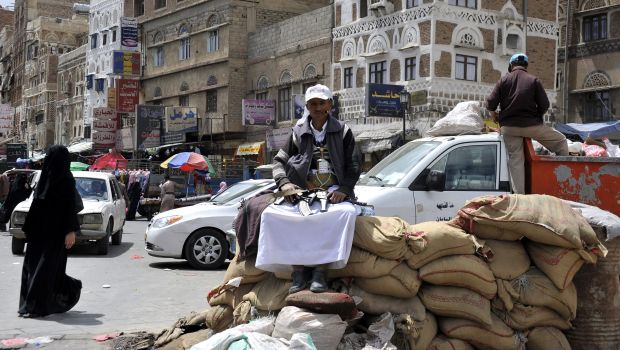
A young gunman loyal to the Shi’ite Houthi movement mans a checkpoint in Sana’a, Yemen, 07 October 2014. (EPA/YAHYA ARHAB)
Sana’a, Asharq Al-Awsat—President Abd Rabbuh Mansur Hadi met with the ambassadors of the ten countries sponsoring the Gulf Initiative to discuss the latest developments in Yemen as the death toll in the country continues to rise amid increasing violence and instability.
“Ensuring security, stability and unity in Yemen is our top concern. For that purpose, we must make a concession to each other in order to overcome challenges that Yemen is experiencing,” Hadi told the ambassadors of the five permanent members of the UN Security Council, a number of Gulf Cooperation Council (GCC) members states, and the European Union.
Over the past two days Yemen has seen unprecedented levels of violence following a series of attacks that killed at least 70 and injured hundreds of civilians and soldiers.
Security in Yemen deteriorated on Friday, one day after Hadi’s candidate for the post of prime minister Ahmed Bin Mubarak turned down the post in response to Houthi pressure.
During the meeting with the G10 ambassadors, Hadi discussed the “nature of procedures that led to Bin Mubarak’s nomination” and his “acceptance of Bin Mubarak’s request to be exempted from forming the new government,” state-owned SABA news agency reported.
Bin Mubarak on Thursday rejected his nomination in a step he said was aimed at preserving national unity and ending the state of polarization in the country. Bin Mubarak’s nomination was met with fierce resistance from Yemen’s Houthis, the Shi’ite group that seized control of large parts of the capital Sana’a on September 21.
The Houthis—whom opponents allege are backed by Tehran—remain in control of key state buildings in Sana’a and other Yemeni cities, refusing to disarm and operate as one of the political powers despite earlier agreements with the central government.
Hadi called on the ambassadors to assume “their responsibilities towards Yemen’s stability . . .completing the remaining tasks of the transitional phase based on the outcomes of the National Dialogue Conference (NDC) and the peace and national partnership agreement.”
Hadi is expected to hold a fresh round of discussions with representatives of the country’s political parties and the G10 ambassadors on Saturday to name a new candidate for prime minister, an official speaking on condition of anonymity told Asharq Al-Awsat.
Local sources informed Asharq Al-Awsat that the Houthis appear to be stepping up their presence in the capital, particularly following the group’s recent call for a “popular revolution” in Yemen.
Following Friday’s attack, supporters of the group stepped up the rhetoric against Hadi, demanding that he take more stringent security measures, with some calling on him to step down.
Meanwhile, at least 20 soldiers were killed and 15 injured on Friday in an attack on a security checkpoint in the coastal city of Mukalla in the southern Hadhramaut governorate, SABA reported.
Hamdan Al-Rahbi contributed reporting from Sana’a
